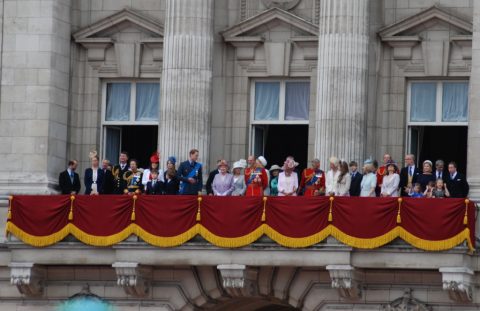At The Ruffian, Ian Leslie considers the form of government nobody set out to design, but has proven to be one of the most stable forms of government we’ve had:

The royal family at Buckingham Palace for the Trooping of the Colour, 30 June, 2015.
Photo by Robert Payne via Wikimedia Commons.
When I said that nobody would design this system, that is not a criticism. Evolved systems tend to work better than designed ones, even if they can seem maddeningly irrational to those who presume to know better. Yesterday somebody posted extracts from an essay by Clement Attlee. As a socialist, Attlee might have been expected to oppose or at least be sceptical of constitutional monarchy, but he was a strong believer in it. Attlee was writing in 1952, a year after the end of his term as Prime Minister, and the same year that Queen Elizabeth came to the throne. When he refers to the monarch, he refers to her – one of those examples of how the Queen’s longevity stretches our perception of time. “You will find the greatest enthusiasm for the monarch in the meanest streets,” he writes. After qualifying as a lawyer, Attlee ran a club in the East End of London for teenage boys raised in dire poverty. He remembers one of them saying, “Some people say as how the King and Queen are different from us. They aren’t. The only difference is that they can have a relish with their tea every day.”
Attlee notes that Norway, Sweden, and Denmark — countries in which there is “the highest equality of well-being” — have royal families. That’s still true and we might add the Netherlands to that list. While it’s impossible to disentangle the many historical factors that make for a decent and successful society, it is at the very least tough to make the case, on evidence alone, that democratic monarchies are inherently bad. Indeed, they seem to work pretty well versus other forms of government. As the left-wing American blogger Matt Yglesias remarked yesterday, “It’s hard to defend constitutional monarchy in terms of first principles, but the empirical track record seems good.”
If this is so, I’m interested in why (let’s agree, by the way, that there isn’t one definitively superior way of running a country, and that every system has flaws). My guess is that it’s because constitutional monarchies do a better job than more “rational” forms of government of accommodating the full spectrum of human nature. They speak to the heart as well as the head. Attlee puts it succinctly: “The monarchy attracts to itself the kind of sentimental loyalty which otherwise might to the leader of a faction. There is, therefore, far less danger under a constitutional monarchy of the people being carried away by a Hitler, a Mussolini or even a de Gaulle.” (I need hardly add that for Attlee, these were not merely historical figures.) Martin Amis, in the closing paragraph of his 2002 piece about the Queen for the New Yorker, expresses the same idea with characteristic flair:
“A princely marriage is the brilliant edition of a universal fact,” Bagehot wrote, “and as such, it rivets mankind.” The same could be said of a princely funeral — or, nowadays, of a princely divorce. The Royal Family is just a family, writ inordinately large. They are the glory, not the power; and it would clearly be far more grownup to do without them. But riveted mankind is hopelessly addicted to the irrational, with reliably disastrous results, planetwide. The monarchy allows us to take a holiday from reason; and on that holiday we do no harm.
Yes, there is something deeply sentimental and even loopy about placing a family at the centre of national life, and ritually celebrating them, not for what they’ve done but for who they are. But here’s the thing: humans are sentimental and yes, a bit loopy. Constitutional monarchies accept this, and separate the locus of sentiment from the locus of power. They divert our loopiness into a safe space.
In republics, the sentimentality doesn’t go away but becomes fused with politics, often to dangerous effect. Russia, despite having killed off its monarchy long ago, retains an ever more desperate hankering after grandeur, the consequences of which are now being suffered by the Ukrainians. America’s more “rational” system has given us President Donald Trump, and I don’t think it’s a coincidence that their political culture is more viciously, irrationally polarised than ours.
Monarchy, in its democratic form, can also be a conduit for our better natures. It gives people a way to express their affection for the people with whom they share a country, by proxy. Think about that boy in Limehouse: it’s not that he wouldn’t have preferred to have relish with his tea – to be rich, or at least richer. But he recognised that, as different as human lives can be, they are always in some fundamental ways the same. People have mothers and fathers (present or absent, kind or cruel), brothers and sisters, hopes, fears, joys and anxieties. That’s why one family can stand in for all of us, even if that family lives in a very privileged and singular manner.



